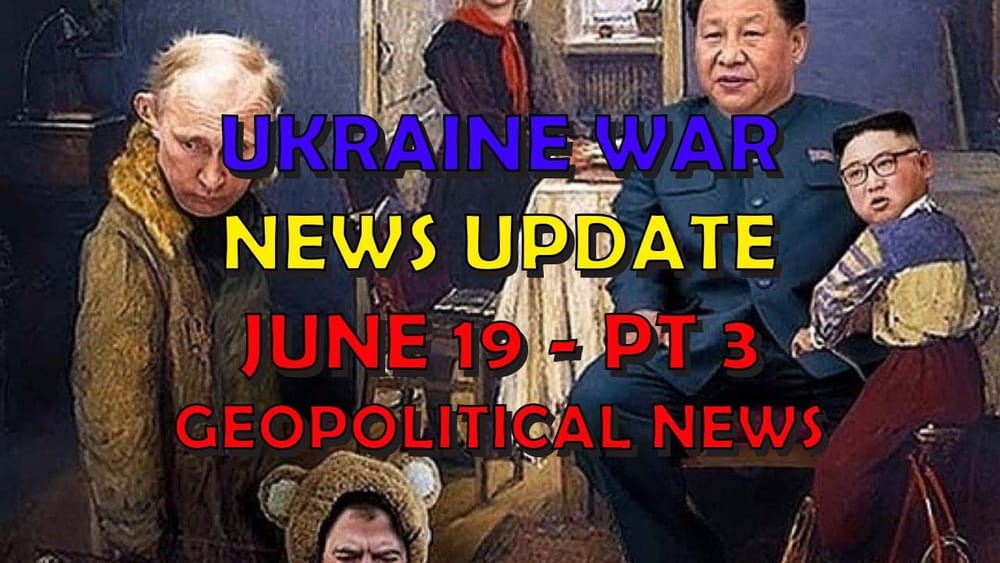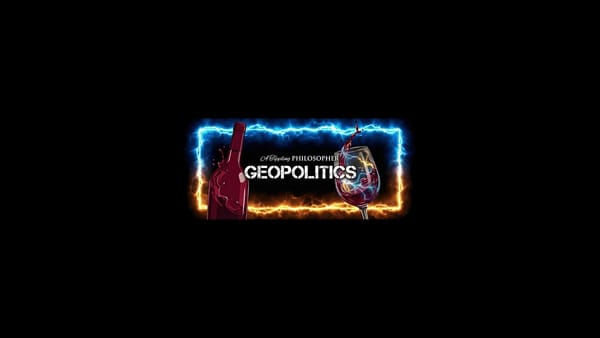Ukraine War Update NEWS: Geopolitics News
Table of Contents 📖
"They're being really aggressive to the Philippines. You worry about Taiwan."
Hello Team
🎦 00:00-00:09⏩
Jonathan welcomes viewers to another ATP Geopolitics video. He explains that this is the third part of his Ukraine War Update series for the 19th of June 2024. Today's video will focus on geopolitics, kicking off with a discussion about Putin's visit to North Korea.
Return to top⤴️
Putin visits North Korea
🎦 00:09-03:15⏩
Jonathan analyses Putin's recent visit to North Korea, drawing attention to how the dynamics between the two countries have shifted. He notes that Russia's need for military equipment has placed them in a subservient position, with North Korea able to leverage this need to their advantage. He also comments on the pomp and ceremony surrounding Putin's visit, pointing out a strange interaction where neither leader seemed willing to enter the car first. He finishes by highlighting a report stating that Putin and Kim Jong-un signed a comprehensive strategic partnership agreement, which seemingly includes an agreement for mutual military support.
Return to top⤴️
China's support for Russia
🎦 04:14-06:03⏩
Jonathan discusses China's crucial role in propping up Russia's war efforts, primarily through under-the-radar economic assistance. He then addresses a viewer's question: given Russia's dependence on China, why hasn't China been subjected to crippling secondary sanctions? Jonathan explains that targeted sanctions are being applied, especially within the finance sector, and suggests that finding the right balance is crucial. While acknowledging that China is a growing concern, he emphasises that overplaying the sanctions card could provoke unwanted escalation and even lead to a full-blown trade war.
Return to top⤴️
China-Philippines tensions
🎦 06:03-07:09⏩
Jonathan shifts his attention to China's escalating aggression in the South China Sea. He revisits the incident involving Chinese ships using water cannons to attack Filipino vessels near the Thomas Shoal (Second Thomas Shoal), which lies over 800 miles from the Chinese mainland but within the Philippines' exclusive economic zone. He expresses concern about China's increasingly assertive behaviour in the region, highlighting this as another potential flashpoint in an already volatile geopolitical landscape.
Return to top⤴️
Sweden approves US military presence
🎦 07:09-08:05⏩
Jonathan talks about the Swedish parliament's recent approval of a defence agreement that would grant the United States access to 17 military bases and training areas within Swedish territory. He notes that this move represents a significant escalation of the US military presence in the Nordic region. He suggests this is an unintended consequence of Russia’s invasion of Ukraine as they wanted to stop NATO expansion.
Return to top⤴️
Serbian President predicts Russia-West confrontation
🎦 08:05-09:41⏩
Jonathan highlights Serbian President Vucic’s prediction of a major confrontation between Russia and the West within three to four months. He expresses concern over this statement, particularly in light of what he terms the “Putin Paradox”. This paradox, he explains, posits that the more Russia struggles on the battlefield in Ukraine, the more likely Putin is to resort to extreme measures. While acknowledging that checks and balances exist within the Russian system to prevent unilateral action, Jonathan reiterates his worry about the escalating situation.
Return to top⤴️
Jonathan's views on liberalism and defence
🎦 10:47-11:27⏩
Jonathan shares his personal views on liberalism and defence, describing himself as a liberal who understands the “paradox of tolerance”. This principle, he explains, dictates that unlimited tolerance of intolerance can ultimately lead to the destruction of tolerance itself. Therefore, he advocates for a “liberalism with teeth”, one that actively defends liberal democracies and is prepared to use force when necessary.
Return to top⤴️
Positive developments at peace summit
🎦 11:27-13:45⏩
Jonathan shares some positive news from the ongoing peace summit in Switzerland. He highlights the Australian delegation head, Bill Shorten’s, surprise at the summit’s positive atmosphere, suggesting it’s a good sign that someone geographically removed from the conflict sees progress. He then shares a poignant speech from the President of Kosovo, who was herself a child refugee during the Kosovo War. She implores the international community to show the same compassion and support for the people of Ukraine as they did for Kosovo 25 years earlier.
Return to top⤴️
NATO Secretary General succession
🎦 13:46-14:33⏩
Jonathan discusses the potential succession of Jens Stoltenberg as NATO Secretary General, noting that Stoltenberg has endorsed Mark Rutte, the outgoing Dutch prime minister. He mentions receiving information from a viewer, “JR”, about Dutch media prematurely announcing Rutte’s candidacy. Jonathan expresses uncertainty about the specifics of the selection process and whether an official announcement is imminent but acknowledges that Rutte appears to be a strong contender for the position.
Return to top⤴️
International sanctions and support for Moldova
🎦 14:33-15:06⏩
Jonathan provides updates on international sanctions and support for Ukraine, mentioning Canada’s recent imposition of sanctions on 13 high-ranking Russian officials linked to Alexei Navalny’s death in prison. He also reports that Italy and Moldova have signed a declaration of support for Moldova’s accession to the European Union, with Italian President Sergio Mattarella expressing strong support for Moldova’s European path.
Return to top⤴️
Giorgia Meloni and Italy's stance on the war
🎦 15:06-16:43⏩
Jonathan delves into Italian politics, specifically the stance of Italian Prime Minister Giorgia Meloni and her far-right coalition government on the war in Ukraine. He expresses surprise at Meloni’s strong pro-Ukraine stance despite concerns about her far-right affiliations. He analyses the dynamics within the Italian government, highlighting the pro-Russian leanings of the other two coalition parties, Forza Italia and La Liga, while contrasting this with Meloni’s Brothers of Italy party, which has been vocal in its support for Ukraine. He also criticises Italy’s low defence spending, noting that it falls short of NATO requirements and that Italy could be contributing more to Ukraine’s defence efforts.
Return to top⤴️
Meloni blocks Orban's Fidesz party
🎦 16:43-19:50⏩
Jonathan discusses Meloni’s growing influence within the EU, describing her as a potential “kingmaker”. He then reveals that Meloni has blocked Viktor Orban’s Fidesz party from rejoining the European Conservatives and Reformers (ECR) group in the European Parliament. He sees this as a positive development, explaining that it isolates Fidesz and Orban, a pro-Russian figure, further marginalising them within European politics. Jonathan then criticises Orban, a favourite of Donald Trump, stating that Orban is not good for Ukraine, NATO, or the EU and that he represents a destabilising force within Europe.
Return to top⤴️
Orban's "Make Europe Great Again" slogan
🎦 19:50-20:41⏩
Jonathan criticises Viktor Orban's choice of the slogan "Make Europe Great Again" for Hungary's upcoming EU presidency. He questions whether Orban is attempting to undermine Biden's presidency and support Trump's claims of a stolen election. He suggests that this slogan, along with Orban’s overall approach, reveals his true allegiances and further confirms his alignment with Trump's brand of populism.
Return to top⤴️
Trump and Epstein
🎦 20:41-22:40⏩
Jonathan digresses from the Ukraine war to share a humorous anecdote about Donald Trump Jr.'s recent claim that his father was not on Jeffrey Epstein's list of associates. He praises Twitter's Community Notes feature for quickly debunking this claim by providing evidence from court records showing that Trump flew on Epstein’s plane at least seven times. Jonathan also reads a 2002 quote from Trump himself, where he admitted to knowing Epstein for 15 years and suggested that they both shared a fondness for “beautiful women on the younger side.”
Return to top⤴️
Russian disinformation and AI chatbots
🎦 22:40-26:35⏩
Jonathan returns to the issue of disinformation and how it has been weaponized in the context of the Ukraine war. He refers to an incident where a Twitter bot, later revealed to be of Russian origin, malfunctioned and exposed its programming, which involved generating pro-Trump content. He then cites a report stating that 32% of AI chatbot responses are pushing Russian propaganda, highlighting the growing challenge of combating AI-driven disinformation. Jonathan shares his personal experience of engaging with people online, particularly on Facebook, who have been influenced by Russian narratives. He recounts conversations with fellow left-wingers who espouse anti-American imperialism views alongside pro-Russian talking points. He expresses concern about the ease with which individuals can be misled by a combination of human trolls and sophisticated AI bots designed to spread disinformation.
Return to top⤴️
Romanian and Georgian football fans
🎦 26:46-29:34⏩
Jonathan addresses recent attempts by Russian media to manipulate events at the UEFA Euro 2024 football championships to fit their narrative. He debunks a claim that Romanian fans chanted “Putin! Putin!” during a match against Ukraine, explaining that the chant was actually “Putin khuilo”, a popular Ukrainian protest song that translates to “Putin is a dickhead”. He then reveals how Russian TV selectively edited footage of Georgian fans chanting the same slogan during a match against Turkey, attempting to downplay anti-Putin sentiment. Jonathan criticises these attempts at censorship and praises social media users for exposing the truth. He finishes by highlighting Russian media’s use of copyright strikes to remove videos that contradict their narrative.
Return to top⤴️
Russian espionage in Germany
🎦 29:34-31:51⏩
Jonathan discusses a report from Euromaidan Press revealing that Russia is resorting to blackmail and bribery to recruit spies in Germany following the expulsion of over 600 Russian diplomats from Europe last year. He explains that far-right groups, diplomats, and individuals involved in providing assistance to Ukraine are being targeted, as Russia seeks to undermine support for Ukraine and sow discord within German society. He points to the recent case of two German citizens jailed for high treason after being paid almost $428,560 for spying for Russia. Jonathan concludes by underscoring the serious threat that Russian espionage poses to European security, pointing out that Russia employs a wide range of tactics, including cyberattacks and sabotage, to achieve its objectives.
Return to top⤴️
Russia's "alternative Olympics"
🎦 31:51-32:39⏩
Jonathan mocks Russia's attempt to create an "alternative Olympics" with the BRICS Games, which feature athletes from Brazil, Russia, India, China, and South Africa. He points out that Russian media have already declared Russian athletes as winners of numerous medals, often in events where they were the sole competitor due to a lack of participation from other countries. Jonathan uses this example to highlight Russia's desperation for international recognition and its willingness to manipulate events to maintain a facade of strength.
Return to top⤴️
Ukrainian fencer refuses to salute Russian opponent
🎦 32:41-34:22⏩
Jonathan shares a story from the world of fencing, where a Ukrainian fencer, Elena Krivitska, refused to salute her Russian opponent, Maya Guchmazova (competing under the Georgian flag), after winning their match. He contrasts Krivitska’s dignified silence with Guchmazova’s outburst, in which she angrily questioned why Krivitska was “allowed to act like that." Jonathan uses this anecdote to illustrate the deep resentment felt by Ukrainians toward Russia and the lack of self-awareness displayed by some Russians who seem oblivious to the reasons behind this animosity.
Return to top⤴️
"I'm [Nationality] and I hate Russians" trend
🎦 34:22-36:25⏩
Jonathan discusses a social media trend where people share personal stories about why they “hate Russians”. He explains that the trend often focuses on historical grievances, particularly the Soviet Union’s treatment of its satellite states. He shares a specific example from an Estonian Twitter user who posted a photo of their great-grandparents who died in Siberia after being deported during the Soviet era. Jonathan clarifies that he isn’t trying to incite hatred but is instead highlighting the deep-rooted mistrust and resentment that many people in countries bordering Russia harbour toward their neighbour. He acknowledges that there are exceptions to this sentiment, citing Hungary as an example but stresses that historical context is essential for understanding the complexities of the current geopolitical situation.
Return to top⤴️
Wrap up
🎦 36:27-36:45⏩
Jonathan concludes the video by thanking his viewers for watching and expressing gratitude for their continued support. He signs off with his usual call to action, encouraging viewers to like, share, subscribe, and hit the notification bell.
Return to top⤴️



